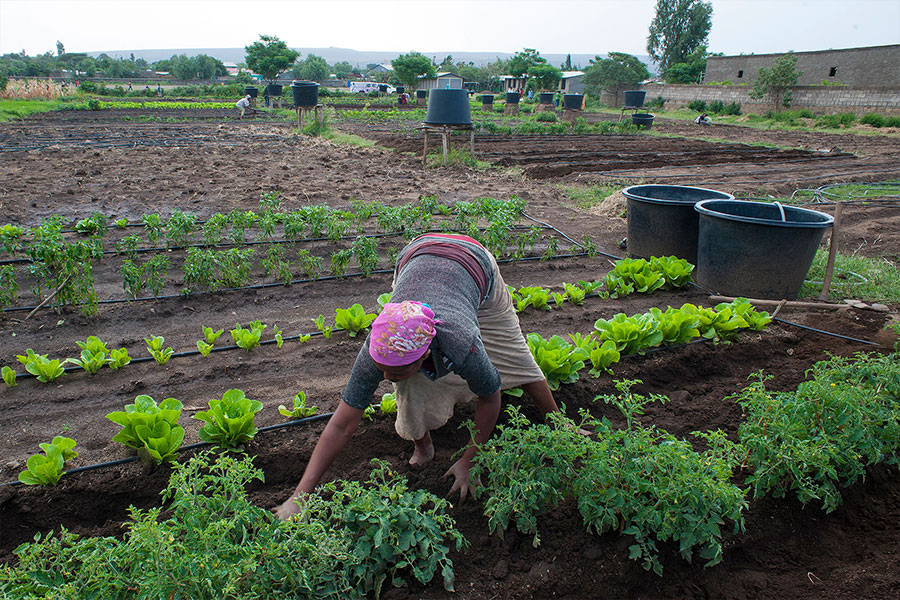
News Analysis | Jan 19,2024
Jun 10 , 2023
By MUNIR SHEMSU ( FORTUNE STAFF WRITER )
Creating a strong regulatory infrastructure and standardizing the quality of goods for the export sector is prioritised under the new bill put forth by officials at the Ministry of Trade & Regional Integration. Provided it will see the light of day, they hope to supervise and integrate quality entering and leaving the country for the following decade.
The lack of a regulatory body guaranteeing the nature and makeup of goods has led to a decline in international demand. Issues related to quality have become a sticking point, with Ethiopia's ascension into the World Trade Organization (WTO) restarted in 2018 after an on-and-off process for a couple of decades.
A month ago, State Minister Endale Mekonen, indicated that 90pc of locally made products fail to thrive in international markets for lack of standards, during a panel discussion with local manufacturers. The notion is further backed by the nine-month report of the Ministry of Industry, which indicated that the five manufacturing sectors of the country brought in 266 million dollars, meeting only 69pc of the initial target.
Mesfin Abebe, an advisor at Ministry, observes a policy framework to keep all relevant elements within a supply chain accountable is important.
"The policy will help us reel in unlicensed intermediaries," he told Fortune.
Prior regulations of accreditation, standards and product are poised to be repealed while new laws dictating technical inspection, a proclamation on the formation of a national quality council and improved measurement metrics are foreshadowed.
Destaw Mekuanint (PhD), head of policy & strategy research at the Ministry, observes local commerce has largely relied on mere transactions of basic goods while little attention is given to the nature of the products. He indicated the absence of suitable technology and properly formulated working guidelines to govern the standards have hampered the country's participation overseas.
"Quality is a priority in international markets," he told Fortune.
He believes engagement from foreign markets requires certain and uniform product standards. According to Desta, proper accreditation and uniformity standards will be top priorities going forward with the policy, which is expected to bolster the country's quality monitoring infrastructure.
Studies suggest a credible quality signal conveyed by certification is cited to give recognition of complex quality information with low transaction costs, given the distance between buyers and sellers in global markets.
Coffee, flowers and fruits contributed half of the total export earnings, with 40.8pc of total export earnings out of the 4.1 billion dollars total attributed to Europe, according to data from the National Bank of Ethiopia (NBE). Switzerland is the number one destination for exports with 32pc of the total amount.
Yilma Mengistu, standard development director at the Ethiopian Standard Institute, stresses the necessity of harmonization between regulators within the government.
"Overlap of regulatory mandates needs to be solved," he told Fortune.
Yilma recommends conformity assessment and accreditation as pillars of implementing the African Continental Free Trade Area (AfCFTA), which he sees as becoming realizable through the implementation of the new policy. He said the new policy is predicated upon a Pan-African quality policy which should be able to bring harmonization between future trading partners.
Experts observe the high rejection rate of products sent abroad results from disregard for quality in the production chain with exporters that lack the foresight to consider long-term business horizons.
Dagmawi Ewnetu, a lecturer of supply chain management at Gonder University, argues that the poor quality of products is a result of several factors, not the least of which is the availability of adequate and competent professionals. He suggests participants in the production chain should keep quality at the back of their minds during the selection of inputs and when products leave the facilities.
"Its importance is not recognised," he told Fortune.
He believes that standard regulation throughout the chain would yield better quality products deemed suitable to prospective international buyers.
PUBLISHED ON
Jun 10,2023 [ VOL
24 , NO
1206]

News Analysis | Jan 19,2024

Advertorials | May 15,2023

Viewpoints | Jan 21,2023

Fortune News | Dec 25,2021

Sunday with Eden | Jun 21,2025

Dec 22 , 2024 . By TIZITA SHEWAFERAW
Charged with transforming colossal state-owned enterprises into modern and competitiv...

Aug 18 , 2024 . By AKSAH ITALO
Although predictable Yonas Zerihun's job in the ride-hailing service is not immune to...

Jul 28 , 2024 . By TIZITA SHEWAFERAW
Unhabitual, perhaps too many, Samuel Gebreyohannes, 38, used to occasionally enjoy a couple of beers at breakfast. However, he recently swit...

Jul 13 , 2024 . By AKSAH ITALO
Investors who rely on tractors, trucks, and field vehicles for commuting, transporting commodities, and f...

Jul 5 , 2025
Six years ago, Ethiopia was the darling of international liberal commentators. A year...

Jun 28 , 2025
Meseret Damtie, the assertive auditor general, has never been shy about naming names...

Jun 21 , 2025
A well-worn adage says, “Budget is not destiny, but it is direction.” Examining t...

Jun 14 , 2025
Yet again, the Horn of Africa is bracing for trouble. A region already frayed by wars...